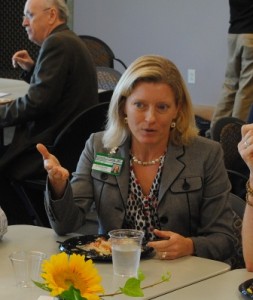Economic Challenges and the Future of Teaching – A Faculty View of the CFT’s 25th Anniversary Symposium
“[I]t is readily apparent that any enterprise will benefit from young men and women who can think critically, creatively, broadly yet deeply, in a variety of content areas. Vanderbilt will contribute to the future of teaching by fostering these skills and by elucidating their inherent value to all stakeholders.“
This is a guest post by Kimberly Lomis. Kim is Associate Dean for Undergraduate Medical Education, Associate Professor of Medical Education and Administration, and Associate Professor of Surgery at the Vanderbilt School of Medicine. Kim also served on the CFT Advisory Board from 2006 to 2011. The post is part of our series of posts related to the CFT’s 25th anniversary.
 The most rewarding aspect of being involved with the Center for Teaching over the past nine years has been the opportunity to interact with faculty members and students from throughout the Vanderbilt community. Sharing educational ideas and struggles with individuals from diverse perspectives is enlightening and stimulating. The CFT 25th Anniversary Symposium on the Future of Teaching reinforced the value of such exchange.
The most rewarding aspect of being involved with the Center for Teaching over the past nine years has been the opportunity to interact with faculty members and students from throughout the Vanderbilt community. Sharing educational ideas and struggles with individuals from diverse perspectives is enlightening and stimulating. The CFT 25th Anniversary Symposium on the Future of Teaching reinforced the value of such exchange.
I participated in a discussion of the influence of economic pressures on higher education. Of the many aspects we considered, the theme which intrigued me most was the potentially conflicting roles of higher education in promoting academic inquiry versus preparing graduates for the workplace. After a brief philosophical debate over the ideal function of academia, the conversation quickly refocused on what is best for our students. A student who chooses a field of study based solely upon economic prospects will likely be unhappy; one who pursues her passion then finds herself unemployed after graduation, equally so. How will Vanderbilt attain an ideal balance between these demands?
The manifold perspectives and intellectual strengths in the room were wielded in brainstorming. Learning communities, focused around specific content areas, emerged as a potential means to blend academic stimulation and moral support. Faculty and students with shared interests could gather for activities outside the classroom to invigorate and extend relationships beyond a single course. Exposure to professional roles related to the field, especially those beyond students’ preconceived notions, would inspire and motivate students. Intentionally coaching students in interpersonal skills would promote networking and the pursuit of scholarly opportunities. The Commons Seminars were cited as a non-threatening, low-commitment means for first year students to explore varied intellectual interests; more senior students in attendance expressed a desire for similar programming throughout their education to support a broad view of opportunities. How we choose to measure student progress certainly influences behavior. One student described his idea of a “life GPA,” considered alongside the traditional academic GPA, to track the tremendous personal development that occurs during one’s education, both within and beyond the classroom. A vital and diverse Vanderbilt campus will support the formation of young adults who will contribute to the workforce in myriad ways.
At the School of Medicine, we are engaged in curricular revision intent upon promoting curiosity, deeper learning and adaptive expertise. Our existing Advisory Colleges have assumed a more academic role, serving as the platform for some of our most challenging content. Thoughtful discussions of the patient’s experience of illness, medical ethics, healthcare policy, and meta-cognition are centered in these learning communities. We have instituted personalized learning plans, in which students and advisors regularly establish and revisit individual goals in academics, leadership and personal wellness.
Healthcare delivery is a fascinating process situated at the intersection of many scholarly endeavors, and we capitalize upon our University’s assets with collaborations throughout campus. In our setting, it is readily apparent that any enterprise will benefit from young men and women who can think critically, creatively, broadly yet deeply, in a variety of content areas. Vanderbilt will contribute to the future of teaching by fostering these skills and by elucidating their inherent value to all stakeholders. Our commitment as an institution to ongoing learning and improvement, embodied in the activities of the Center for Teaching, serves to model these attributes to our students.
We occasionally feature guest posts here on the blog as part of our efforts to cultivate dialogue about teaching and learning among Vanderbilt faculty, students, and staff. We recognize that everyone’s teaching context is different, but we hope that hearing others’ perspectives on teaching and learning will help our readers reflect on their own teaching. If you would like to contribute a guest post, please let us know.

Leave a Response